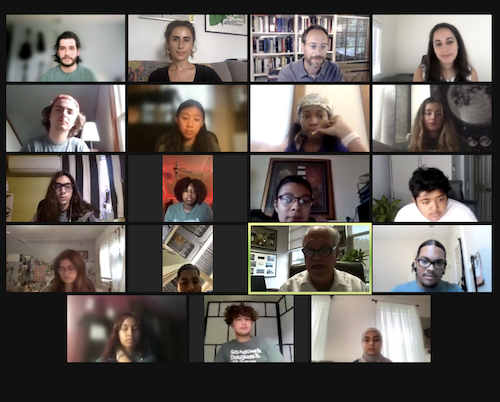
From July 11th-23rd, 2021 thirteen rising seniors from New Haven public schools participated in the first-ever online version of Citizens Thinkers Writers. “I’ve had such a great time,” stated one student at the close of the summer intensive. “I’m glad I was able to connect with my peers in a way that wasn’t forced. I see myself making lifelong friendships because of this program.”
Students met every day on Zoom for two seminar sessions where they discussed thought-provoking works of literature and philosophy. “The professors especially gave me a lot to chew on in terms of acknowledging counter arguments, analyzing quotes, and addressing further questions that I never thought about,” shared one participant. Another added, “The best moments in seminars [were] when people got into debates or added to other people’s ideas. We would already have covered the basics of the readings, and at that point we tried to think through questions all together and see other points of view.”
This year’s cohort also attended small-group discussion sessions and 1:1 tutoring sessions with their undergraduate mentors. “[Undergraduate mentor] Sebastian told us that it was ok to share half-baked ideas, because as everyone was open to switching viewpoints, it was ok to use the seminars and sessions as [a] testing floor for thoughts we had. I really tried to adopt that policy in all the discussions I had, and it helped me engage in the seminars even better. It was very freeing,” said one student.
Reflecting on the reading and writing assignments, one participant expressed that “the system of reading then writing then discussing really made sense given that we often ended our discussions with more questions than answers.” Another testified that after completing and getting feedback on their assignments, “I feel like I am able to integrate my own voice into my writing as well as [discuss] concepts more explicitly rather than have the reader try to guess my line of thinking.”
In order to facilitate the community building so integral to CTW, afternoon and evening activities were hosted on Gather, a platform that allows for greater student-driven interaction and socialization. “I liked gather because I could socialize if I wanted to but keep to myself when I wanted to,” reported one student in the end-of-program survey. Another conveyed, “Gather was great, and I wish I had heard of and started using it sooner. Far more engaging than Zoom. It came much more naturally to me. The afternoon activities were great, they never got tedious, and it never felt like we were being forced into them.”
Now as CTW Fellows, the class of 2021 continues to meet online each month, and are currently planning a virtual event for younger NHPS peers who want a learning environment where they “won’t be criticized for thinking and asking questions,” where they can “try out new ideas,” and where they can “develop new ways of thinking.” The inspiration for this project came from the students themselves: “I found myself thinking about why this curriculum and type of program isn’t offered more widely to students,” mused one of the Fellows. “I believe all New Haven students would find this program to be beneficial. I also question why our schools don’t use the same texts that we read during this program.”
Although CTW hopes to return to in-person instruction as soon as possible, the success of the last year has demonstrated that meaningful intellectual communities can be formed online. Whatever its mode of instruction, CTW remains committed to being as transformative and rewarding an experience as possible for all participants.